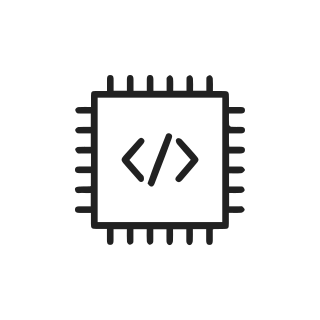The Embedded Course provides a comprehensive guide to software development on Embedded Systems, offering both theoretical and practical knowledge required for developing Real-Time systems. This is achieved through the utilization of ARM-based development boards at a highly professional level, catering to practical projects in the high-tech industry.
Throughout the course, participants will cover techniques, development tools, work environment, debugging, typical issues in Embedded Systems development, and their solutions:
- Participants will learn to configure and install necessary development tools (work environment), employ a Cross compiler for compiling source files into Binary files for Embedded systems, and execute them on development boards.
- Usage of Debug Tools for bug detection.
The Embedded Course imparts the essential knowledge needed to work with ARM Cortex M3/M4/M7 Processor-based Embedded Systems.
The course specifically focuses on modern Peripheral Devices commonly used in the industry, including:
- ARM Processor Architecture - Working principles, Conventional Registers.
- Dealing with hardware registers.
- General Purpose Input Output (GPIO).
- High-resolution Timers.
- Pulse-width modulation (PWM).
- Communication protocols usage, such as Universal Asynchronous Receiver Transmitter Communication (UART), The Inter Integrated Circuit (I2C), and Serial Programming Interface (SPI).
- Interrupt Controller.
- Analog to Digital Converter (ADC).
- Memory Management Unit (MMU).
- Network interface Driver.
- And more Embedded topics.
The course involves hands-on development of numerous exercises and solutions, including writing device drivers using ARM architecture-based development boards.

ARM Embedded Systems Development
ARM (originally Acorn RISC Machine) is an instruction set architecture for RISC processors developed by ARM Holdings. Today, numerous component manufacturers (such as Samsung, Motorola, ST) rely on the ARM architecture. A wide variety of processors utilize this core, forming the foundation for Embedded Systems products in various industries and daily life, including smart controllers, alarm systems, smartphones, tablets, and more.
ARM processors come in various architectures, ranging from microcontrollers (like ARM-7) through Cortex processors to powerful multi-core processors.
Real-Time Development in the Embedded Course
The ARM course is a part of the essential knowledge required for Real-Time engineers. Students interested in further studies after the course can choose to participate in Real-Time Development tracks. Embedded and Real-Time Embedded development tracks are among the most sought-after tracks in the industry. Each year, there are thousands of job openings for individuals with expertise in these fields, and the conditions are excellent with above-average salaries.
Who is the ARM course for?
- Anyone interested in learning Embedded Systems or Real-Time Embedded development.
- Software engineers, computer scientists, or individuals with a programming background.
- Engineers and electronics engineers.
ARM Embedded Systems Course Prerequisites
- Knowledge of processor architecture — advantageous.
- Experience with operating systems, Linux — advantageous.
- Background and/or experience in C programming — mandatory.
- Professional knowledge interview.
ARM Course Description
This course is a practical course that includes lectures and hands-on exercises.
The duration of the course is approximately 90 academic hours.
The course includes:
- Arm programming instruction
- Class exercises accompanied by explanations, homework assignments, and solutions on the course website
- Course booklet
- Videos and presentations on the course website
- Usage of development boards for working with Embedded Systems
- Toward the end of the course, each student will complete a practical project that summarizes the acquired knowledge during the course
The lectures take place once a week in the evenings or mornings.













